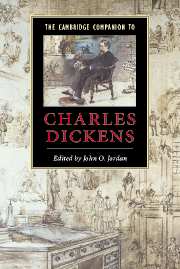Book contents
- Frontmatter
- Preface
- 1 The life and times of Charles Dickens
- 2 From Sketches to Nickleby
- 3 The middle novels
- 4 Moments of decision in Bleak House
- 5 Novels of the 1850s
- 6 The late novels
- 7 Fictions of childhood
- 8 Fictions of the city
- 9 Gender, family, and domestic ideology
- 10 Dickens and language
- 11 Dickens and the form of the novel
- 12 Dickens and illustration
- 13 Dickens and theatre
- 14 Dickens and film
- Selected bibliography
- Index
- Series list
7 - Fictions of childhood
Published online by Cambridge University Press: 28 May 2006
- Frontmatter
- Preface
- 1 The life and times of Charles Dickens
- 2 From Sketches to Nickleby
- 3 The middle novels
- 4 Moments of decision in Bleak House
- 5 Novels of the 1850s
- 6 The late novels
- 7 Fictions of childhood
- 8 Fictions of the city
- 9 Gender, family, and domestic ideology
- 10 Dickens and language
- 11 Dickens and the form of the novel
- 12 Dickens and illustration
- 13 Dickens and theatre
- 14 Dickens and film
- Selected bibliography
- Index
- Series list
Summary
Dickens is conventionally credited with having imported into a central role in the novel the figure of the innocent child - often suffering and orphaned, abandoned, or simply neglected - from Romantic poetry, where it (and its healthier and happier siblings) had been celebrated, notably if esoterically, by William Blake and, far more popularly, by William Wordsworth. Since a growing concern with children was itself a central feature of the evolving ethos of the middle class throughout the nineteenth century, especially in Britain and the United States, it is an interesting albeit impossible speculation to imagine what might have happened to our ideas of the family had Dickens opted for a career as an actor, say, instead of that as a novelist - much less what the fictions of Emily and Charlotte Brontë, George Eliot, Robert Louis Stevenson, Henry James, Mark Twain, Lewis Carroll, Rudyard Kipling, James Joyce, among many others, would have been like without the example of Dickens before them. Impossible though the speculation may be to complete, it seems clear that Dickens has, via such characters as Oliver Twist, Little Nell, Tiny Tim, Paul Dombey, and a host of others, made an enormous difference in the way our culture thinks about children.
An oversimplified account of Dickens’s role in this story1 would run thus: in the early modern period and undoubtedly associated with the emergence of “individualism” and the rise of the middle class and the “domestic,” there emerged an idea of the child quite unlike earlier conceptions, which had assumed children to be essentially animalistic and uninteresting, or merely deficient, undeveloped, and incomplete adults.
- Type
- Chapter
- Information
- The Cambridge Companion to Charles Dickens , pp. 92 - 105Publisher: Cambridge University PressPrint publication year: 2001
- 3
- Cited by



